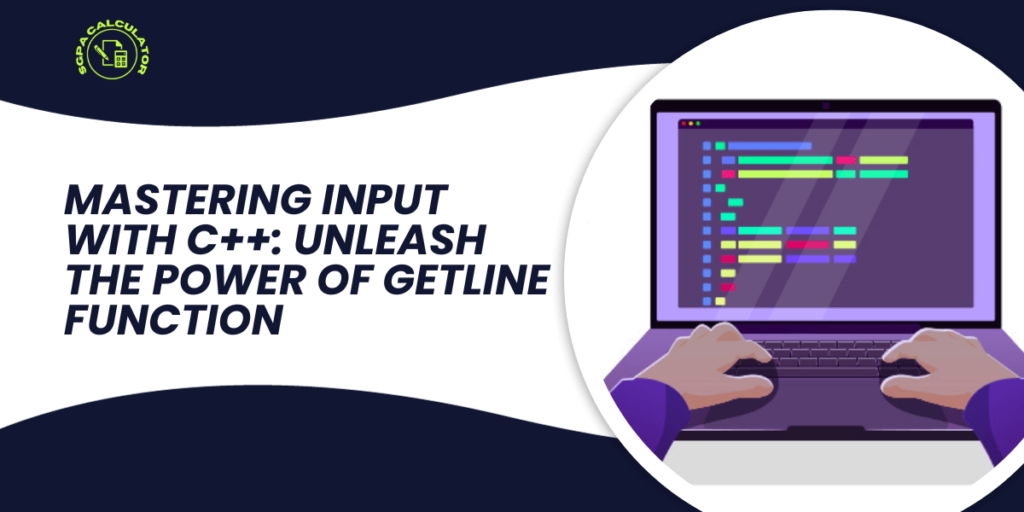In the vast world of programming, efficient input handling is a crucial skill for any coder. Whether you are a beginner or an experienced developer, understanding the nuances of input management can significantly enhance your programming prowess. In the realm of C++, one indispensable tool for input processing is the getline function. This article will delve into the depths of the getline function in C++, exploring its functionalities and demonstrating how it can be a game-changer in your coding journey.
The Basics of Input in C++
Before we dive into the specifics of the getline function, let’s take a moment to understand the basics of input in C++. Input in C++ is typically performed using the cin object, which is part of the iostream library. While cin is excellent for reading single words or numeric values, it falls short when dealing with entire lines of text. This is where the getline function comes into play.
Introducing getline Function in C++
The getline function in C++ is a powerful tool for reading entire lines of input. Unlike cin, which stops at the first whitespace character, getline reads until it encounters a newline character or reaches the specified delimiter. This makes getline particularly useful for handling strings and sentences in user input.
Let’s take a closer look at the syntax of the getline function:
“`cpp
include <iostream>
include <string>
int main() {
std::string userInput;
std::getline(std::cin, userInput);
// Process the userInput as needed
return 0;
}
“`
Here, std::getline takes two parameters: the input stream (in this case, std::cin) and the string variable where the input will be stored.
Read Our Blog: Indian Certificate of Secondary Education
Advantages of Using getline
1. Handling Spaces and Whitespace
One of the primary advantages of getline is its ability to handle spaces and whitespace characters. Consider a scenario where you need to input a full name or a sentence. Using cin would only capture the first word, leaving the rest of the input untouched. With getline, the entire line, including spaces, is stored in the designated string variable.
2. Reading from Files
The getline function is not limited to reading from the standard input (keyboard). It can also be used to read from files. This flexibility makes getline a versatile choice when dealing with data stored in external files. By specifying a file stream as the first argument, you can seamlessly read lines from files.
getline Function in Action
Now, let’s explore a practical example to illustrate the power of getline. Suppose you are building a program to receive user feedback, including multiline comments. Using getline, you can effortlessly capture the entire comment, preserving its formatting.
“`cpp
include <iostream>
include <string>
int main() {
std::string userComment;
std::cout << “Please enter your feedback (press Enter twice to submit):\n”;
// Using getline to capture multiline input
std::getline(std::cin, userComment, ‘\n’);
// Process the userComment as needed
std::cout << “Thank you for your feedback!\n”;
return 0;
}
“`
In this example, the user can input a multiline comment, and getline ensures that the entire comment is stored in the userComment variable.
Advanced Usage: Specifying Delimiters
While getline defaults to using the newline character as the delimiter, you can customize this behavior by specifying a different delimiter. This is particularly useful when dealing with CSV (Comma-Separated Values) files or any scenario where the input is delimited by a specific character.
“`cpp
include <iostream>
include <sstream>
include <string>
int main() {
std::string csvData = “John,Doe,30,Software Engineer”;
std::istringstream inputStream(csvData);
std::string token;
while (std::getline(inputStream, token, ‘,’)) {
// Process each token
std::cout << “Token: ” << token << std::endl;
}
return 0;
}
“`
In this example, we use getline with a custom delimiter (‘,’) to extract individual tokens from a CSV string.
Online C++ Compiler and getline
Now that we have explored the getline function and its capabilities, it’s essential to discuss how to apply this knowledge in a real-world coding environment. Online C++ compilers provide a convenient platform for practicing and testing code snippets without the need for a local development setup.
Utilizing Online C++ Compilers for getline Practice
Online C++ compilers offer a user-friendly interface where you can write, compile, and run C++ code directly from your web browser. Platforms like repl.it, ideone.com, or cpp.sh provide a seamless experience for experimenting with getline and other C++ features.
To get started, open your preferred online C++ compilers and create a new C++ file. Copy and paste the following code snippet to experiment with getline:
“`cpp
include <iostream>
include <string>
int main() {
std::string userInput;
std::cout << “Enter a line of text:\n”;
std::getline(std::cin, userInput);
std::cout << “You entered: ” << userInput << std::endl;
return 0;
}
“`
Execute the code with cpp compiler and observe how getline captures the entire line of text, including spaces.
Common Pitfalls and Best Practices
While getline is a powerful tool, it’s essential to be aware of potential pitfalls to avoid unexpected behavior in your programs.
1. Handling Empty Lines
If getline encounters an empty line, it will still consume the newline character, leaving the string variable empty. To address this, you can check if the line is empty and handle it accordingly.
“`cpp
include <iostream>
include <string>
int main() {
std::string userInput;
std::cout << “Enter a line of text:\n”;
std::getline(std::cin, userInput);
if (userInput.empty()) {
std::cout << “You entered an empty line.\n”;
} else {
std::cout << “You entered: ” << userInput << std::endl;
}
return 0;
}
“`
2. Error Handling
When dealing with user input, error handling becomes crucial. Check the stream’s state after using getline to ensure that the input operation was successful. If there’s an error, handle it appropriately.
“`cpp
include <iostream>
include <string>
int main() {
std::string userInput;
std::cout << “Enter a line of text:\n”;
if (std::getline(std::cin, userInput)) {
std::cout << “You entered: ” << userInput << std::endl;
} else {
std::cerr << “Error reading input.\n”;
}
return 0;
}
“`
Conclusion
In conclusion, mastering input handling is a fundamental skill for any C++ programmer. The getline function stands out as a versatile tool for efficiently processing entire lines of text, making it an invaluable asset in various scenarios. Whether you are dealing with user input, reading from files, or parsing delimited data, getline provides a robust solution.
As you continue your C++ journey, don’t forget to leverage online C++ compilers for hands-on practice. Experiment with getline and explore its capabilities in different scenarios to solidify your understanding. With the power of getline at your fingertips, you’ll be better equipped to tackle real-world programming challenges and unleash the full potential of your C++ applications. Happy coding!





